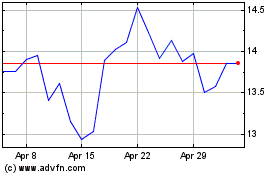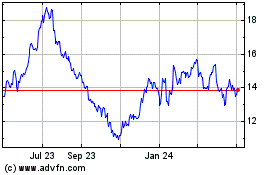Airlines Foresee More Cuts Despite Government Aid
March 27 2020 - 5:46PM
Dow Jones News
By Alison Sider
Airlines are facing a bleak future, even with $50 billion in
promised government aid.
Airline and labor leaders had lobbied hard for an immediate cash
infusion and got it: the $2 trillion stimulus package passed by the
House of Representatives on Friday includes $50 billion in
assistance for airlines, including $25 billion in direct grants to
continue paying workers.
Airlines say the funds will help them avoid mass layoffs and
shutdowns. But carriers are still contending with the near collapse
of demand for air travel as fear of contagion and a patchwork of
state and local restrictions to address the coronavirus pandemic
have encouraged people to stay home.
Based on the spread of the virus and the hit to the global
economy, travel demand could remain suppressed into next year,
United Airlines Holdings Inc. Chief Executive Oscar Munoz and
President Scott Kirby told employees in a letter on Friday. The
airline has already cut its April schedule by more than 60% and
plans to make deeper cuts in May and June. While United pledged not
to reduce its workforce for six months, the executives said cuts
may be inevitable.
"If the recovery is as slow as we fear, it means our airline and
our workforce will have to be smaller than it is today," they
wrote.
In order to receive the payroll grants, airlines must agree not
to furlough or lay off employees until the end of September, and to
maintain service deemed essential by the Transportation Department,
such as to rural communities and to carry health-care supplies.
Still, airlines are looking for ways to slash costs, and
thousands of workers have accepted voluntary unpaid time off. Less
flying also means fewer opportunities for pilots and flight
attendants to work.
"There are going to be fewer hours available to work for many of
our team members," American Airlines Group Inc. Chief Executive
Doug Parker said Thursday night. American said it will cut May
flying by 80%.
The grants and loans from the government come with additional
strings attached. Treasury Secretary Steven Mnuchin has indicated
that the U.S. government would take stakes in airlines in exchange
for billions of dollars in direct grants. Industry officials have
said the form and amount of the government's investment could vary
between airlines, but that they don't anticipate that the
government will impose onerous terms.
Southwest Airlines Co. Chief Executive Gary Kelly said Thursday
night said that Southwest is losing money on just about every
flight, and that while private capital has remained available,
government assistance could be a good option.
"We're going to work hard to make a commitment not to furlough
people anyway, but the government grant program could prove to be
something that gives us a lot more confidence that we can follow
through with that," he said.
Write to Alison Sider at alison.sider@wsj.com
(END) Dow Jones Newswires
March 27, 2020 17:31 ET (21:31 GMT)
Copyright (c) 2020 Dow Jones & Company, Inc.
American Airlines (NASDAQ:AAL)
Historical Stock Chart
From Mar 2024 to Apr 2024

American Airlines (NASDAQ:AAL)
Historical Stock Chart
From Apr 2023 to Apr 2024
